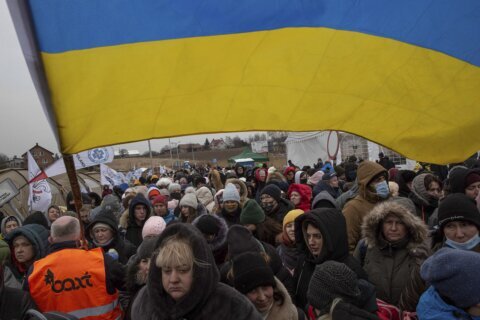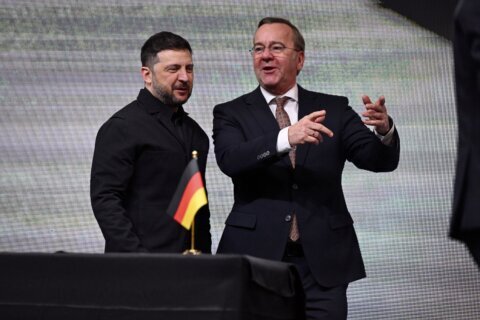Just days after Russia began its unprovoked attack on cities all across Ukraine, 22-year-old Julia Tymoshenko called her relative in Moscow. “I told her about spending a night in the basement of our building in Kyiv, waking up at 4:00 a.m. to the sounds of explosions and fighter jets. My aunt told me, ‘Well, you don’t know who did that.'”
“Really?” asked correspondent Lee Cowan.
“Yes. She said, ‘Well, we’re seeing one thing on the news, you’re seeing another thing on the news.’ My response was like, ‘It’s not the news for me; it’s my reality, and it’s what I see with my own eyes.”
Tymoshenko went a step further: “I sent her pictures of my mom being in the bomb shelter, us fleeing on the packed train, and she blocked me.”
“She blocked you after you sent the pictures?” asked Cowan. “Not even, ‘Are you okay? I don’t know what’s goin’ on, but are you okay?’ None of that?”
“Yeah,” Tymoshenko sighed. “It’s shocking for me. Like, I know that everything that they receive is, like, sort of flipped. They call black, white and white, black, and that’s how they have been living for decades.”
For those living in Russia, the singularity of the state-run media is impossible to escape.
In a broadcast on Russian state media, a television presenter said, “Today Russia started a special military operation to protect people who have been subject to abuse and genocide by the Kyiv regime for the last eight years.”
The Russian military is portrayed as doing God’s work – even the Russian Orthodox Church has endorsed the so-called “special operation” as a moral imperative.
And if you’re wondering how Vladimir Putin can convince so many good people to believe in such bad things, consider this: “Propaganda rests on what people already believe, what people already think they feel, the things that they accept at their deepest level,” said Nick Cull, who has studied propaganda most of his life. He’s a professor of Public Diplomacy at the University of Southern California.
“By alleging that Ukraine is dominated by Nazis and that it is necessary for [Putin] to repeat the historic mission of the, as it was then, the Soviet Union in defeating Nazis, this is incredibly powerful stuff to invoke,” he said.
What’s different, Cull says, is just how many lies are being spread: “The volume of disinformation coming out of Russia over the last four years is unprecedented.”
Julia Ioffe has covered the Kremlin for more than a decade, and is currently Washington correspondent and founding partner of the news site Puck. She says two-thirds of Russians are in favor of the war, “because the war that they’re approving of is not the actual war that’s happening.”
Just this past week, when disturbing pictures emerged of a bloody pregnant woman stumbling out of a bombed-out maternity hospital, Russians were told she was an actor, and that she probably wasn’t even pregnant. She gave birth this past Friday.
“So, they’re buying it, right, for the most part?” asked Cowan.
“It’s hard not to buy it,” Ioffe replied. “They’ve now blocked Facebook, blocked Twitter, they’re slowing down YouTube. Basically all of Russian independent media has been rooted out – or what was left of it was rooted out in the last week. Now that’s all gone completely, and it’s just state media.
“Russians can be very good at suffering for a cause they believe is just. And I think that’s what the Kremlin is counting on – that if they keep telling the Russian people that ‘This is a just war and a war of liberation,’ people won’t rise up and demand change when their economic circumstances get worse and worse, which they will.”
If there’s any good news, experts say, it’s that’s propaganda usually backfires.
Cull said, “Any time you introduce a distortion into the media environment, somebody has to pick up the tab down the road, when it turns out that the world is not as described.”
And in Ukraine, the first Russians to recognize that may eventually be the invading army itself.
Ioffe said, “When they roll into Ukraine, they’re seeing the resistance. They’re seeing how much people hate them. They’re seeing tens of thousands of Ukrainians telling them to go home and cursing at them. And it’s one of the reasons the advance isn’t going very well because everybody was lied to, and they can see it.”
As Russian troops continue their assault, Julia Tymoshenko hopes that the lies that launched Vladimir Putin’s war would one day prove to be the spark that ignites a revolution.
Cowan asked, “What’s the one thing you’d want the average person in Russia to know about what’s going on?”
“We fully support those who find courage to speak up and to resist their government, knowing that most likely they will go to jail,” Tymoshenko replied. “And I just wanna hug those people and tell them ‘thank you.’ We just need more of those kinds of people in Russia to speak up and to stand up against their own dictator.”
Story produced by Alan Golds. Editor: Steven Tyler.







